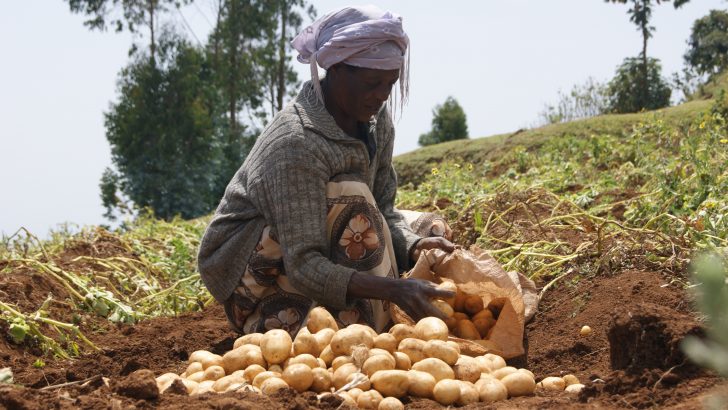Potatoes have often been regarded as the symbolic food of the Irish, providing taste, nourishment and sustenance. Harnessing onto their usefulness, a Dublin-based charity has started a global initiative to bring needed potatoes to some of the most impoverished countries in Africa.
Vita is a successful Irish NGO working with the world’s poorest people in Ethiopia and Eritrea. It was established in 1989 under the patronage of St Teresa of Calcutta, and enables rural families to achieve sustainable livelihoods through agricultural programmes and access to services and markets.
Although it is a secular organisation, the values of the Catholic Faith, such as kindness and care are some of the key building blocks of the charity.
“The principles of Laudato Si’ are embedded into our work”, says Ciara Feehely, Head of Fundraising & Communications, adding, “we were founded within the Catholic faith although we are not a faith-based organisation”.
Goals
One of the goals of Vita is to improve family nutrition and provide access to affordable food, water and energy for three million people by 2020, and millions more through partnerships.
A unique way this aspiration is being achieved is through one of Vita’s programmes called the ‘Irish Potato Coalition’, which is currently supporting 12,000 farmers in Ethiopia alone to substantially increase their yield.
The width and complexity of the task has been lightened by numerous organisations helping the cause: a knowledge transfer programme with Teagasc, the Ethiopian Research Centre, the International Potato Centre, leading Irish potato experts such as John O’Shea and the Dennigans, as well as the support of Sisters of Mercy Western Province.
“It’s about collaborating”, said Ciara. “The Vita-led Irish Potato Coalition is in seven countries. We have partners that can use our learning in other countries. We have created this learning and understanding and have also written a widely-available book.”
After four years, many farmers have seen their yields increase three-fold improving the communities and economy.
“It’s been massively successful”, said Ciara, adding, “farmers are no longer dependent on aid with the extra potatoes they can grow. Getting the seed right is everything. We started with a small amount of importing, but now we have a seed producers’ co-op. They are now producing seeds that are pure, clean and disease free.”
One example of a farmer who has been impacted by this initiative is Tesfaye Tole from South East Ethiopia. With the help of a loan from Vita and the International Potato Centre, he had an increase in his potato yield and was able to buy a maize mill which produces a small but regular income. At planting and harvesting time, he employs 15-20 labourers to help him and has rented out another half hectare. As a result, he put a metal roof on his house, bought a bed and has hopes for his children to attend college. The adaptability and plenitude of the potato means that it can become a steadfast in rural communities. “The potato is a very climate-smart crop, it doesn’t need as much water as other crops, and grows relatively easy, said Ciara. “It’s one of the most important food sources”.
Vita also focuses on other methods by which rural communities can improve and become self-sustainable. It is the only NGO that works in Eritrea, providing mixed-generation programmes which are knowledge- led and emphasise technological transfer.
“We would describe ourselves as a next generation agency. We’re totally different, this has never been done before. In Eritrea we fix wells rather than build new ones because it’s much cheaper”, said Ciara. “In the last 13 months, we have fixed 222 community wells (water points) which meant over 230,000 people had access to clean water, which is a huge number.” Vita ensures that all of projects are enacted through collaboration with local communities, local government and relevant stakeholders.
Alongside environmental initiatives from the Vita Green Impact Fund which delivers carbon reducing and life transforming programmes in East Africa, Vita also focuses on women empowerment, by which women act as agents of change for development.
Numerous studies have shown that women are more susceptible to poverty, experiencing it at a greater level for longer period of time. With less access to the tools needed to escape poverty, and the lack of access to key instruments such as financial capital or education, women become more entrenched into female poverty.
Women provide the majority of the agricultural labour in sub-Saharan Africa, provide up to 80% of food in developing countries and are traditionally responsible for collecting firewood in the countries where Vita works. With the improved cooking stove projects, the time spent collecting firewood is reduced by half, allowing women to spend more time on income-generating activities.
“One of the abiding images is women carrying bundles of sticks, said Ciara. “We’re about liberating women from that drudgery, that waste of life. There is a focus on women, because women are the drivers of change”.
For information about Vita and the work that they do, see: http://www.vita.ie


 Colm Fitzpatrick
Colm Fitzpatrick Potato farming in Africa.
Potato farming in Africa.